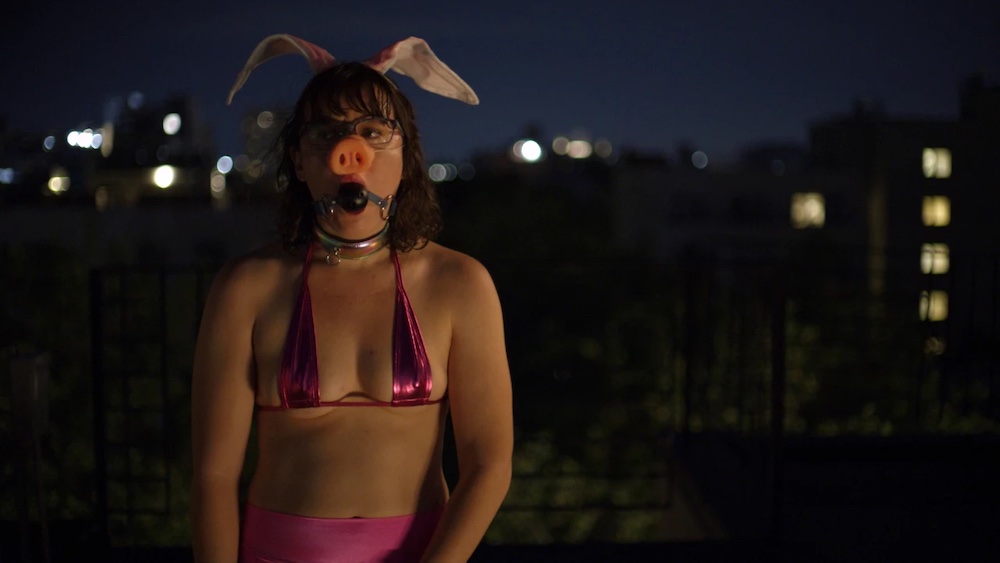
A Jewish thirtysomething, Ann (Joanna Arnow) has never been in a conventional relationship. She engages in submissive sexual relationships with “sexfriends” and seems dimly uneasy that the most longstanding of these, with Allen (Scott Cohen), is now clocking in at around a decade, with neither one of them knowing very much about the other. She asks him about himself; it turns out he’s a Zionist. She rolls away from him.
The anthropologist David Graeber has analyzed the harm caused to society and individuals by the existence of meaningless so-called “bullshit jobs.” Ann is employed in a classic example of one of these: the objectives are hazy, the prospects limited; she is given an award for having worked in her office for one year and has to tell them it’s actually been over three years — and perhaps even worse, she has to go to meetings and listen to Boomers say things like, “the iPhone was invented.”
Ann’s mother (Barbara Weiserbs, Arnow’s actual mother) specializes in the kind of small talk that is essential well-meant, but represents such a masterpiece of pointlessness that it’s hard not to escape the suspicion she could be trolling or playing some elaborate parlor game. The alternative is that a real live human adult is really, genuinely, asking whether you would like to take a banana with you on the train tomorrow, and if yes would you like to put it in your bag now. Without wanting to throw anybody’s mother under the bus here, it all feels painfully relatable.
These three respective strands — sexual, professional, familial — are the major prisms through which we view Ann’s life. In casting herself as Ann, Arnow the director is able to ask for an unusual degree of exposure from her lead actor, both physically (she is naked for a high proportion of the runtime) and psychologically (Ann is tough but vulnerable, often blank and affectless while somehow simultaneously conveying intriguing depth). In one scene, she wears a ball gag, forcing her mouth open in a silent O, and it’s hard to decide whether she looks more like she’s screaming or yawning — and really, that’s about right; her attitude to life feels like somebody panicking in slow motion but who is too switched off to really fully commit to their own existential crisis.
Apart from Arnow’s lead performance, the other major star in this film is the editing, also by Arnow. “Brilliantly edited” could risk sounding like faint praise, the kind of comment people reach for when they’re struggling to find a polite thing to say about a film they didn’t like much. But it’s the unique rhythm of the way that this film is written and cut that elevates it beyond a standard millennial malaise movie. Multiple scenes have the structure of a really well-constructed one or two panel comic (Arnow also has talent in this area, posting witty line drawings on her Instagram account). So many scenes are incredibly brief and totally standalone. Setup, line, punchline. Or just setup and punchline. Sometimes the punchline is an anti-punchline, a deflationary moment that brutally punctures the scene.
Taken as a whole, the film paints a brilliantly sardonic portrait of Ann’s life, but so many individual scenes could play as stand-alone short films — and not the kind of big, baggy shorts that go on for half an hour and are really imitations of the rhythm and form of a feature. Arnow’s splinters of life owe something to the feel of deadpan Vines, TikToks or Instagram stories, where everything extraneous has been paired away, and yet what is really clever here is that this effect is achieved without feeling hectic or like a music video — the pacing is very relaxed and the camera itself is usually static with very few cuts within the scene itself. The effect is self-contained but crucially never choppy.
You would hope that this is the kind of film that would lead to fame and fortune for Arnow, although it’s also such a perfect example of what can be achieved on a low budget with modest production values that from a strictly creative point of view, material success feels almost irrelevant. But from the wider perspective of it being a good and just thing when obvious talent is rewarded with actual money and not just good reviews, fingers crossed that funders are lining up to commission her.













